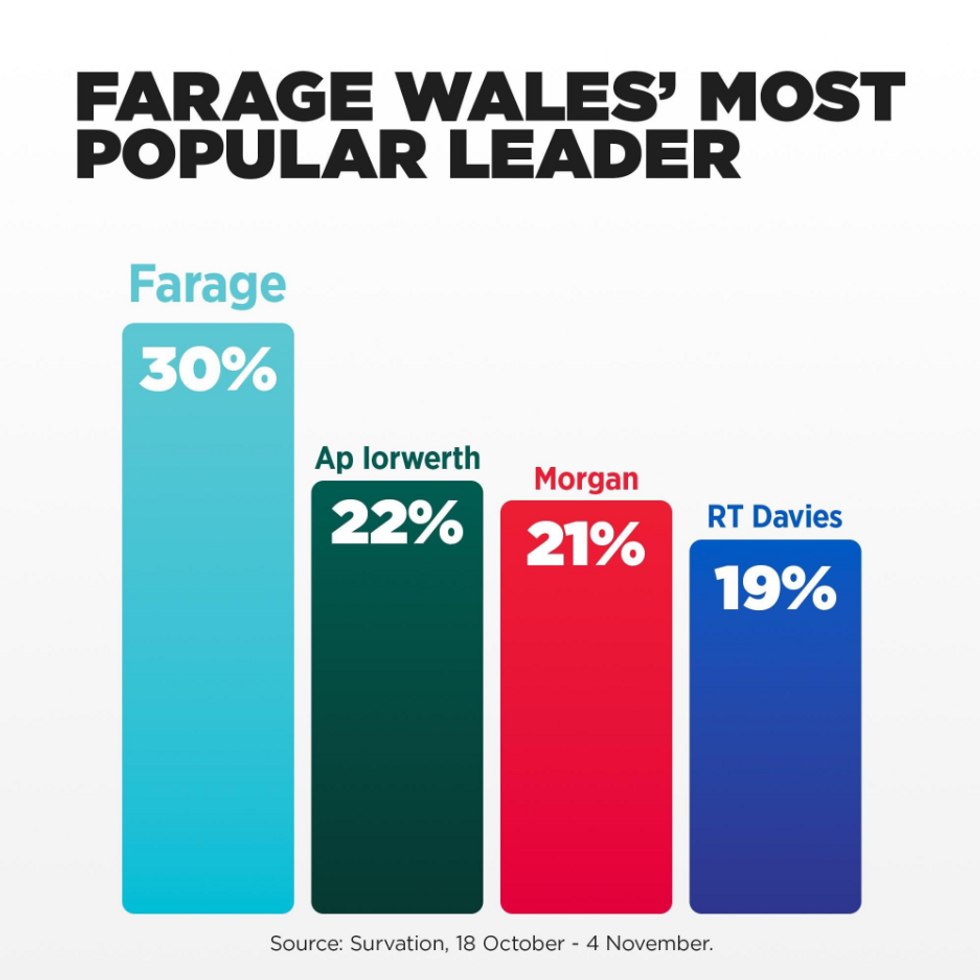PKG NIGEL FARAGE IV CHERRY WALES REFORM CONFERENCE
GB News
Reform held party conference in Newport this weekend as party targets Celtic Nation
Don't Miss
Most Read
Trending on GB News
A poll has found Nigel Farage to be the most popular political leader in Wales as he pledges to ‘replace the Conservatives’ as the opposition party in Wales and ‘take the fight to Labour’.
Speaking to GB News’ Adam Cherry in Newport, the Reform UK leader said: “I think the voters in Wales don't look at the Conservative Party as a viable alternative.
“Our aim is to replace the Conservatives as the main opposition to Labour and to take the fight to them in the Senedd elections.
“If you believe the opinion polls that are out this morning, we already are making real progress.”
Farage’s rallying rhetoric comes after a poll commissioned by prominent Brexit backer Arron Banks found the Brexit supremo to be the most popular leader in Wales.
Survation’s poll put Farage on 30 per cent, nine points ahead of Labour incumbent First Minister Eluned Morgan on 21 per cent and 11 per cent ahead of the Welsh Conservative’s Andrew RT Davies.
It is worth noting Farage is not the leader of Reform in Wales, he is the national leader like Keir Starmer is of Labour or Kemi Badenoch of the Conservatives. Reform currently do not have a leader in Wales.

Poll finds Farage is the most popular leader in Wales
Reform
Farage, who spoke to 800 cheering members at Reform’s party conference in the Celtic Manor- a luxury hotel in Newport- this weekend, also said: “Labour’s national government is bad enough, but have a look at what Labour has done in Wales with devolved powers over the last few years.
“The biggest waiting lists for the NHS in the whole of the country, failing education, lunatic woke policies on a scale that is almost unimaginable, not to mention 20 mile an hour speed limits.
“Thanks to Labour’s devotion to the net zero agenda, primary steelmaking in South Wales is at an end. I think they’ve failed completely.”
The Reform UK leader is on the war path in Wales and smells an opportunity to make real electoral gains after only winning five seats in the General Election.
"This campaign, the one leading up to 2026 will be in that calendar year, for me as national party leader, by far our biggest priority,” confirmed Farage.
The right-wing party is polling 19 per cent in the Senedd- Wales' devolved government- for which elections are just 18 months away.
Reform’s 18 per cent increase puts them ahead of the Tories whose vote share is being whittled down by the Farage effect.
Farage’s gains come partly at Labour’s expense too, who fell seven per cent. Plaid Cymru, the second biggest party in the Senedd, remained on 22 per cent.
Reform is polling particularly strongly in the south Wales Valleys where their vote share has jumped to 26 per cent.
LATEST FROM MEMBERSHIP:
Reform UK is targeting Wales partly because it is the next devolved nation to have elections, and more importantly because it uses a proportional voting (PR) system which will benefit Reform far more than Westminster’s First Past the Post (FPTP) system.
This is because PR allocates seats based on number of votes received.
Reform did not win any Westminster seats in Wales in this year's general election but came second in 13 of the 32 seats, securing 223,018 votes- 16.9% of all ballots cast.
This was 29,000 votes more than Plaid Cymru who won four seats.
On Wales’ proportional system, Farage said: “Well, of course it's going to be 16 constituencies fought under the D’Hont system, which is exactly the same way that the European Parliament elections worked in this country.
“I think under that system, I've got quite a good track record.”
Senedd elections are due to be held in May 2026 and present the first real chance for Reform to make a statement at the ballot box.
Labour has held power in Wales since devolution began in 1999, but the Brexit backing nation has become increasingly disenchanted with the dominant party.







